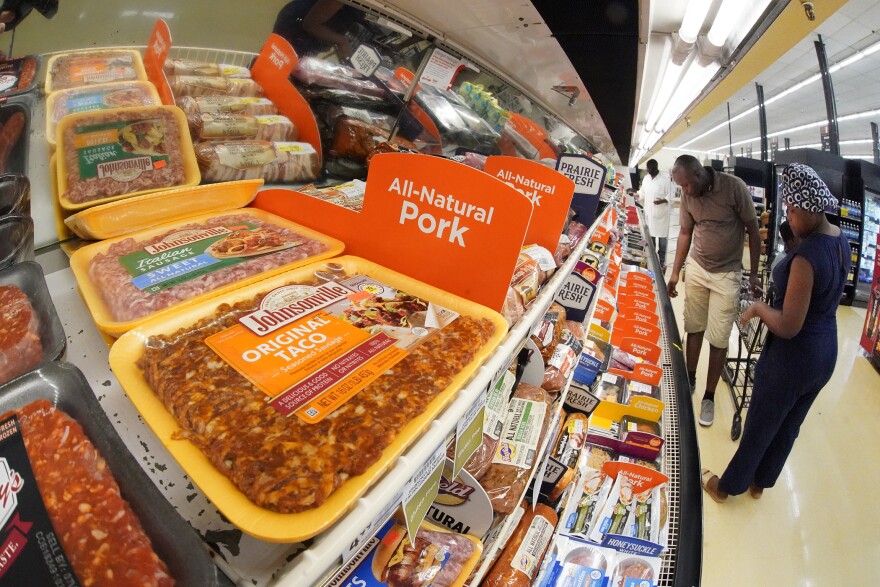Barring a last-minute judicial intervention, pork sales in Massachusetts are about to change.
Nearly seven years after voters approved a new framework for the treatment of livestock, a prohibition on the sale of pork from pigs housed in too-cramped conditions — even those raised and slaughtered in other states — is set to take effect in less than three weeks.
A federal judge on Monday approved a compromise joint motion between state regulators and industry groups, who had challenged the voter-approved law, that allows enforcement of most pork-related regulations to begin Aug. 24.
Products that pass through Massachusetts on their way to final sale destinations in other states, however, will not immediately be subject to the new requirements.
As part of the deal, Attorney General Andrea Campbell's office and the Massachusetts Department of Agricultural Resources (MDAR) will not enforce any new restrictions on "transshipped" pork meat for at least six months. In that span, MDAR will explore a potential regulatory carveout explicitly exempting products that traverse the Bay State but are neither produced nor sold here.
Voters in 2016 approved a ballot question banning the sale of eggs, veal and pork from animals held in conditions deemed cruel. The egg and veal regulations already took effect, but the pork portion remained in limbo amid multiple legal battles.
The National Pork Producers Council, the Massachusetts Restaurant Association and others filed a lawsuit against the Massachusetts measure, and NPPC also challenged a similar law in California.
In May, the U.S. Supreme Court upheld the California law, and animal welfare groups that backed the Massachusetts ballot question campaign — as well as restaurants and grocery stores whose sales would be affected — have been waiting since then for clear answers on what to expect here.
"We're going to finally see implementation. We just want to make sure that the plaintiffs in the case are not going to continue to work to undermine proper implementation," said Wayne Pacelle, president of the Animal Wellness Action group and an architect of the Massachusetts ballot question. "I think our concerns now go to whether the people in the retail industry are going to honor the spirit and the letter of the law."
The already-drafted regulations require pigs to have enough space to lie down, stand up, turn around freely and fully extend their limbs. Massachusetts businesses cannot sell any whole pork meat derived from animals denied that space, regardless of where they were raised, slaughtered and butchered. The prohibition does not extend to "combination food products" that use pork as an ingredient such as hot dogs.
Almost all of the pork sold in Massachusetts comes from other states. According to statistics cited in one lawsuit challenging the Bay State's pig welfare law, Massachusetts residents consumed about 356 million pounds of retail pork in 2022, only about 1.9 million pounds of which was produced within its borders.
Campbell's office said in California, "transshipped" pork is not subject to the same requirements as pork produced in-state or sold to California customers. MDAR is now exploring whether it should also treat transitory pork products differently given that their connection to Massachusetts is relatively limited.
The joint motion that U.S. District Court Judge Margaret Guzman approved Monday pauses just the "transshipped" pork part of the regulations for at least six months, perhaps up to a year, giving plaintiffs a chance to "assess whether the potential regulatory change resolves the remaining legal issue."
Plaintiffs reserved their legal rights to continue challenging the regulations on transshipped pork once the review concludes.
Officials will begin enforcement of other pork regulations governing production and sale in Massachusetts starting Aug. 24, a change that might impact availability and prices of popular cuts.
However, there is one remaining wrinkle that could delay the imminent change: another lawsuit.
A group of pork producers — Triumph Foods, Christensen Farms Midwest, The Hanor Company of Wisconsin, Eichelberger Farms, New Fashion Pork and Allied Producers' Cooperative — sued Massachusetts officials on July 25, alleging in an updated complaint days later that the minimum size requirements the law imposes "are inconsistent with pork industry practices and standards, generations of farming experience, scientific research, and the consensus standards of other states."
Their arguments appear roughly similar to those that industry groups unsuccessfully made in their case against California, before the U.S. Supreme Court ruled that the California law can stand.
"The Act will impose costly mandates that substantially interfere with commerce among the states in hog and pork markets," plaintiffs wrote in the Triumph Foods lawsuit. "It will impose substantial burdens on pig farmers and pork processors primarily outside of Massachusetts, ultimately having a direct impact on the price of pork for all Americans — the vast majority of whom had no say in the Act — in the interstate pork market. It will take years and cost at least tens of millions of dollars for pig farmers to come into compliance with the Regulations."
The judge assigned to the case, William Young, as of Monday had not issued any ruling or ordered Massachusetts regulators to pause enforcement of the pork regulations while the litigation proceeds.



